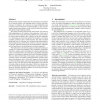1559 search results - page 58 / 312 » The Semantics of Future and Its Use in Program Optimizations |
PLDI
2010
ACM
15 years 1 months ago
2010
ACM
Runtime bloat degrades significantly the performance and scalability of software systems. An important source of bloat is the inefficient use of containers. It is expensive to cre...
OOPSLA
2009
Springer
15 years 2 months ago
2009
Springer
In this paper we explore the idea that the code that constitutes a program actually forms a higher-level, program specific language. The symbols of the language are the abstracti...
IJCAI
2007
14 years 11 months ago
2007
We present a fully connectionist system for the learning of first-order logic programs and the generation of corresponding models: Given a program and a set of training examples,...
105
click to vote
ESOP
2010
Springer
15 years 7 months ago
2010
Springer
Formal reasoning about concurrent programs is usually done with the assumption that the underlying memory model is sequentially consistent, i.e. the execution outcome is equivalen...
EUROGP
2010
Springer
14 years 11 months ago
2010
Springer
We propose a new framework based on Genetic Programming (GP) to automatically decompose problems into smaller and simpler tasks. The framework uses GP at two levels. At the top lev...

